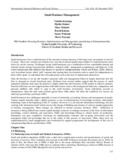| dc.description.abstract | Small businesses form a turbulent part of the national economy because of the large-scale movements in and out of sector. Many new ventures are created every year but an almost equally large number of small businesses close down for various reasons. Challenges facing small businesses are a combination of less controllable internal and external factors arising from personal attributes, technical skills, management competencies and behavior of the owner-entrepreneur that influence the chances of growth of entrepreneurship. (Stoke and Wilson, 2006). Motives vary from those factors which ‘pull’ someone into starting their own business such as search for independence to those which ‘push’ an individual into self employment such as the lack of employment alternatives. Once the business is set up, the founder’s personal skills and management behavior largely determine how the firm is managed in crucial functional areas. Evidence from several studies suggest that the success of small enterprises depends more upon the policies it adopts rather than the buoyancy of the market in which it operates. External influences are less important than individual factors such as the management behaviors, competency and personal attribute with which to cope in the small business environment. Some individuals succeed as entrepreneurs when the ends seem stacked against them while others fail when the conditions for success are relatively good (Foley and Green 1989). Small businesses face challenges especially in areas of marketing, accounting, finance and management of people. Various experts describe today’s global economy as one in transformation of knowledge economy. Information technology came at the beginning of the 21st century. However, it is not only the information technology, but also working with information itself which conveys the change of thinking and creation of value in modern approaches to business management. These changes are reflected in current economy (Graham, 2002). Utilization of resources is being shifted from current capital strategic resources to strategic resources in the form of information knowledge, creative thinking and innovation. Skills and knowledge belong to critical factors of production. Enterprises can gain competitive advantage by implementing continual and on-going innovations and the managerial skills and knowledge that are at the centre of this process of innovation. Often, these facts are underestimated by small entrepreneurs and overlooked by support programmes for development of this size of entrepreneurship (Burns and Dewhurst 1996) | en_US |

